
this week’s
US House Passes MEGOBARI Act Targeting Georgian Officials as Washington Responds to Democratic Backsliding



this week’s
US House Passes MEGOBARI Act Targeting Georgian Officials as Washington Responds to Democratic Backsliding

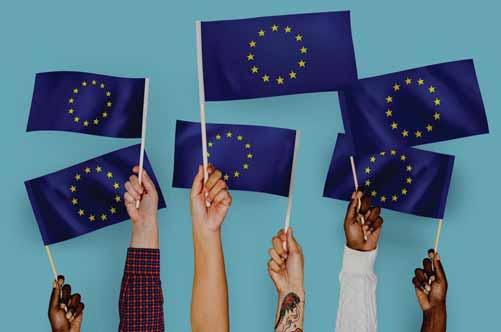
PAGE 2
Ukraine Latest: Limited Ceasefire Marred by Ongoing Strikes and Drone Activity
From Promise to Punishment: How Washington Turned on The Republic of Georgia
PAGE 4
Costa Coffee Marks Official Entry into Georgia with Grand Opening in Tbilisi
Merab Kopaleishvili in the Context of Contemporary Georgian Art
Whispering through Cataclysms: The Pulse of Giya Kancheli, between Prayer and Protest POLITICS PAGE 3


OP-ED BY LASHA KASRADZE
The scene was downtown Tbilisi. The year 2005. And the 43rd President of the United States, George W. Bush proclaimed that before the winds of freedom blew from Baghdad to Beirut, it was Georgia’s Rose Revolution that inspired freedom-loving folks across the region. The president’s bouts of messianic fervor were imbued with religious and philosophical undertones. With a spirit of Christian militancy, Mr. Bush espoused a teleological determinism that freedom would one day guide Georgia to its emancipation from Russian captivity. However, what stuck in the collective psyche of Georgian society since the president’s visit, was not the ideological and philosophic underpinnings of his speech, but a more simplistic one-liner: “ Georgia is a beacon of liberty for this region and the world”.
Sharing the stage with the president, was of course his “golden boy” Mikheil Saakashvili (Misha, as he was popularly known). Young, energetic and westerneducated, Saakashvili had become a useful idiot for the neoconservative elite in Washington. From Bush to Cheney, to the long line of usual suspects in the neoconservative and neoliberal think tank establishment, he was their lapdog whose purpose was to create a political environment in Georgia perpetually hostile to Russia. Anyone who questioned the wisdom of this radical and foolish policy was labeled pro-Russian, backward and anti-western in Misha’s political system.
In all fairness, Saakashvili and his United National Movement (UNM) did implement some effective and necessary reforms immediately after coming to power as a result of the Rose Revolution in 2003. Police reform was perhaps his most successful achievement, along with the fight against corruption. Importantly, Saakashvili implemented tax reform, which for the first since independence allowed the Georgian government to collect taxes from its citizens, filling the coffers of the treasury. Simply put, the UNM, backed by the west, and particularly Washington, was starting to look like a poster-boy for liberal internationalism. Yet, little did they know that the fanfare would be short-lived, and Georgian society would soon face the specter of state terror which would evoke memories of the Soviet past.
Nevertheless, what made Saakashvili’s government politically attractive during its first few years was the exhaustion and disenchantment that Georgians felt toward the previous government. That government, headed by the former Soviet Foreign Secretary, Eduard Shevardnadze, had fallen from grace. Once considered the savior of Georgia’s statehood in the aftermath of the Georgian civil war during the early nineties, by 2003 he had all but squandered his political capital. Shevardnadze’s enormous political talents and international reputation could not sustain his presidency, which oversaw a notoriously corrupt government. Even his close friend and fellow diplomat, James Baker, had to warn Shevardnadze “in no uncertain terms” that Washington would not take well to “tampering” with elections.
Even so, Baker must have felt a sense of guilt in the recesses of his soul for abandoning his friend – “Silver Fox,” as Shevardnadze was often called. After all, this was the man who had played a key role in ending The Cold War. During my conversation with the former US Ambassador to the Soviet Union, Jack Matlock, Dr. Matlock alluded to what might be perceived as the intersubjective code of honor among older generations of statesmen, when he pointed out that Shevardnadze was not treated fairly, perhaps implying that Shevardnadze
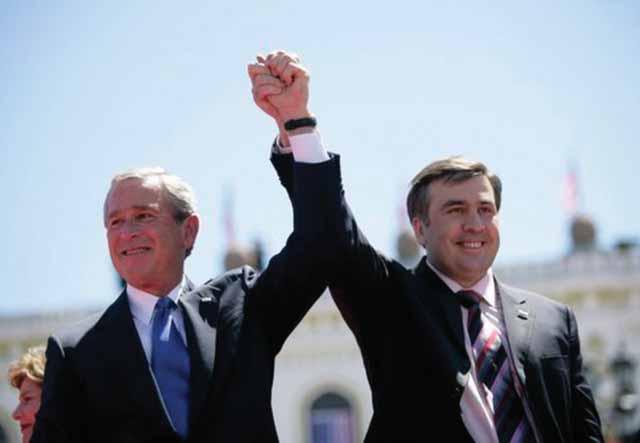
deserved more dignified treatment from his political counterparts after a lifetime of service.
And so, in 2003, a new era of politics in Georgia commenced. Having come to power as a result of the Rose Revolution, the brood of Young-Hegelians took over the project of social, cultural and economic engineering on a massive scale.
To his credit, Shevardnadze did warn the public that Saakashvili was “dangerous.” His warning turned out to be prescient. Saakasvhili’s foot soldiers, the newly-minted, soulless technocrats, would indeed pose a danger to the Georgian statehood. However, by that time it was already too late: the neo-bolshevism had arrived.
With the passage of time, nothing has encapsulated the shallowness of describing Saakashvili’s Georgia as a beacon of liberty, more in the minds of Georgian citizens than the political terror they had to endure under the government of Mikhail Saakashvili and his UNM. An inseparable part of this project was the draconian economic policy, which had to be brought into strict alignment with politics. A much harsher neoliberal economic policy had already been implemented in Russia and had played a key role in bringing post-Soviet Russia’s economy to its knees; Moscow was put at the mercy of Washington—something Russia’s elites have, quite understandably, yet to forget.
Once the UNM created its political and economic vision, it was time to sell it to Georgian society. With political sensationalism, the Orwellian assault on language and meaning followed. For example, the neoliberal economic project became replete with words and phrases such as “libertarianism,” “free markets,” and “Ayn Rand.” At the time, the majority of Georgians did not have a clear idea of the philosophic and intellectual origins of these words, let alone an understanding of the type of economic transformation they were meant to describe. In other words, the economy that was forced upon Georgian society had little to do with the principles of free markets, open competition or libertarianism. Instead, the directive was to simply shove democracy promotion and neoliberal economics down their throats.
Shortly after coming to power, Saakashvili invited Kakha Bendukidze, who had made his fortune in Moscow, to head Georgia’s economy. Bendukidze embarked on an indoctrination campaign to force the ideas of market fundamentalism and privatization on Georgia. His mantra was ‘everything is for sale’, except Georgia’s consciousness. Under his
leadership, major strategic economic assets were sold off to none other than Russia. This was a deeply disturbing and puzzling economic policy, which Georgian society staunchly resisted, but ultimately was no match for the combination of terror and western support deployed by the government. Here was a government whose political image was ostentatiously pro-western, which on a daily basis stirred up hatred against Russia. Yet, ironically, it was perfectly willing to sell off economic assets of strategic importance to Moscow. All this was done under the banner of libertarianism and free markets. This ideology descended into its inevitable absurdity when Bendukidze and Saakashvili proposed the sale of the strategic energy pipeline to Gazprom— the Russian energy giant. Recognizing that such a move would potentially jeopardize the decades-long political and economic investment in Georgia’s energy transport projects from Washington, it took the US State Department’s involvement to stop the proposal from moving forward. Michael Mann, who was in charge of the Caspian Sea energy issues at the time, had to publicly warn against such moves on part of Saakashvili’s government. In addition to this highly questionable economic policy, there was another foolish proposal to sell off Georgia’s strategic railway system to Russian companies, which also failed to materialize.
In the final analyses, it has become clear that the neoliberal and laissez-faire economic gospel produced very little, if any, long-term sustainable industrialization and/or modernization of the Georgian state. In one of his many criticisms of this plan, a well-known scholar on the region, Stephen Jones, recalls that this period in Georgia was marked by “political schizophrenia” instead of economic prosperity.
The extraordinary damage to Georgia did not occur solely because of the failure of neoliberal economics. It was primarily a failure of politics, of the so-called “freedom agenda” that was packaged up and sold to Georgia under false pretenses. The “beacon of liberty” soon turned into a state terror that Saakashvili unleashed on his own people.
The first documented signs of state terror started to appear when the current ruling party, the Georgian Dream (GD), defeated the UNM in the 2012 elections. Recognized by the West as a
country in the back of a truck. Saakashvili is currently serving his time in a “jail cell” (under house arrest) with nurses hovering over him to make sure GD does not face trumped up accusations from extremist parties in Europe that they are slowly killing the former president under appalling conditions. In other words, GD does not want to turn Saakashvili into another “pro-western martyr” like Sergei Magnitsky. Eventually, when the European Court of Human Rights, “confirming that the trial was fair,” ruled that “there were no human rights or health grounds to release Saakashvili,” the extremist opposition parties, along with their European counterparts, had no choice but to acquiesce to the hard facts about their one-time hero.
Under Saakashvili’s reign there was a structure of systemic abuse. Shortly after winning the election in 2012, GD revealed hundreds, if not thousands of secret, illegal tapes that contained compromising materials on Georgian citizens, including horrific videos of rape and physical abuse, which the previous government used in Soviet-style interrogations against its opponents.
“democratic moment”, a peaceful transfer of power occurred in Tbilisi. However, almost immediately after the elections, illusions of peaceful coexistence between the UNM and GD started to shatter. Georgia faced a fundamental question: Would the GD government mount a successful political and legal campaign to prosecute the members of the UNM for allegations of egregious violations of human rights, property rights and economic crimes? It was understood, however, that the challenge was how to persuade Washington that not only did these crimes occur, but that the GD was morally obligated to deliver justice to the families of the victims. It became clear soon after the elections that forming a statewide “truth commission” would be categorically opposed in Washington. When Bidzina Ivanishvili, the founder of GD, met with the US Assistant Secretary of State Philip Gordon, Gordon warned him against “selective prosecutions” unless Ivanishvili wanted to see Georgia’s prospects of joining Euro-Atlantic institutions dwindle.
And yet, a few years later, Washington did show a certain flexibility to GD, when it acquiesced to eventual arrests of the most well-known and notorious ministers of Saakashvili’s regime for abuses of power. For example, Bacho Akhalia, who held the positions of the minister of defense and state intelligence chief, was sentenced to over seven years in prison. Another feared minister of the interior, Ivane Merabishvili was also sentenced to over four years for abuse of power and financial crimes.
But perhaps most shockingly, the Georgian court arrested and sentenced Saakashvili himself for abuse of power, for ordering the beating of a Georgian citizen, businessman and opposition figure. What made this perplexing for Georgian citizens was that GD had repeatedly tried to extradite Saakashvili from Kyiv, Ukraine, but had failed. Saakashvili returned on his own volition, only for GD to arrest him. So far, this strange incident has been explained in Georgia as yet another in a series of erratic behaviors by the former president, who is determined to cause another revolution and make a comeback. If so, this was a major miscalculation on Saakashvili’s part. He and his supporters must have forgotten that UNM’s crimes were still fresh in the collective memory of Georgian society, who could not fathom the idea of Saakashvili’s return to power, which in their minds would certainly mean the return of terror. In any event, he sneaked back into the
Arguably, the most damaging incident, and the one which is believed to have sealed the fate of Saakashvili and his UNM during the 2012 elections, was the prison abuse video taken in a notorious prison on the outskirts of Tbilisi: Gldani Prison, which has earned a coveted place on the list of the worst prisons in the world – a list which also includes the prison at Guantanamo Bay. The horrific scenes of institutionalized abuse of power would also regularly manifest in the streets of Tbilisi. The death of a young bank employee, Sandro Girgvliani, is still remembered in Georgia as a symbol of state terror under UNM. After a verbal altercation with high officials from the Ministry of the Interior in a local restaurant, Girgviliani was taken outside of Tbilisi and killed. There were also said to be signs of torture on Girgvliani’s body. This event galvanized the population, with protesters demanding the arrest of those responsible for the crime. However, after arresting those who were directly responsible for the killing, Saakashvili pardoned them with an early release. They had also been given “extremely favorable treatment” while in prison.
Eventually, the family of Girgvliani mounted a legal case in the European Court of Human Rights in Strasbourg. The court issued a scathing report and expressed shock on “how the different branches of state power…acted in concert in preventing justice from being done.” It determined that the government “failed to consider credible allegations of complicity.” This tragic incident has become a permanent reminder to Georgian society of the hypocrisies of Washington’s “Freedom agenda” during the Saakashvili era.
Yet, Saakashvili’s regime continued to present to the Georgian public and to its Western partners a façade. The reality, however, was quite different. For example, while administrative, law enforcement, or “technical institutions” functioned effectively, the WEF’s Global Competitiveness Report consistently showed that in terms of “judicial independence,” Georgia was “in the 95th place, a lowly 131st place when it comes to “property rights,” and in 141st place with regard to “effectiveness of antimonopoly policy.” The UNM’s program of state extended to the business community and private sector. According to the transparency international report, owners of businesses were constantly terrorized by the government, which used the federal prosecutor’s office as a tool of extortion. Neither did the Western ideology of limited government trickle down to the populace under Saakashvili.
“Georgia is now where Belarus was in 2020… It’s crucial you don’t repeat our mistakes”
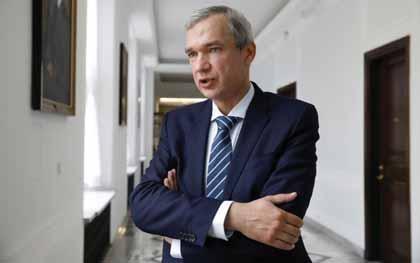
INTERVIEW BY VAZHA TAVBERIDZE
Pavel Latushko, one of the leading figures of the Belarusian opposition, former Minister of Culture under the Lukashenko regime, and former Ambassador to France says it is crucial that Georgia not repeat Belarus’ mistakes. Today, he is wanted by the Lukashenko regime on charges of “attempting to seize power,” alongside Sviatlana Tsikhanouskaya. If he were to return to Belarus, Latushko would face an 18-year prison sentence. He currently serves as the representative for foreign affairs of the Belarusian democratic forces in exile.
In an interview with Radio Free Europe’s Georgian service, Latushko draws stark parallels between today’s Georgia and Belarus in 2020, describes life under a regime where even a single “Facebook like” can land you in prison, and warns that Georgia is on track to share Belarus’s fate — unless it acts now. Vazha Tavberidze spoke to him in Strasbourg during the spring session of the Parliamentary Assembly of the Council of Europe.
MANY OBSERVERS ARE DRAWING PARALLELS BETWEEN WHAT HAPPENED AND IS STILL HAPPENING IN BELARUS, AND THE CURRENT SITUATION IN GEORGIA. HOW JUSTIFIED DO YOU THINK THOSE COMPARISONS ARE?
I think the developments in Georgia could very well follow the same scenario as in Belarus. We’re already seeing some familiar patterns.
Over the past four and a half years, more than 600,000 Belarusians have been forced to leave the country. The reason is the atmosphere of fear, terror, and repression cultivated by the Lukashenko regime, especially since 2020. People are not leaving by choice. And the regime doesn’t stop at the border: it continues to persecute them even abroad.
In the geopolitical context, we have to understand that Russia has set itself a goal: the de facto restoration of the Soviet Union. The methods may vary, but the strategic objective is clear. This is evident in the aggression against Ukraine, which refused to bow to Moscow and is paying a heavy price for that decision. Belarus plays a key role in this strategy. Lukashenko is a pro-Kremlin leader who has always dreamed of making it big in the Kremlin, but he has been outplayed and, as a result, Belarus is now fully dependent on Russia. Yes, formally the country exists, it’s on the map, it’s a member of the UN. But its internal sovereignty is limited, its external sovereignty has been lost, and its military sovereignty has been liquidated. That’s the reality of today’s Belarus.
And in Georgia, we also see the influence of pro-Russian forces. Moldova lives under constant threat of interference. Armenia could easily be the next target. I am certain that Kazakhstan is also at risk. If a country fails to build an effective strategy of resistance, then it will face a scenario like Belarus or Georgia, or perhaps even worse.
ity in Belarus. It won’t bring immediate results, but it will start to shake the foundations. Sanctions must target the regime’s economic base. But at the same time, we must not isolate society. Belarus must not become another North Korea. We have to maintain communication channels and support independent media. Russian propaganda is actively trying to reshape Belarusian identity, and that’s something we must resist at all costs.
IN YOUR VIEW, HOW CLOSE ARE BELARUSIANS TO ACCEPTING A “UNION” WITH RUSSIA IF PUTIN AND LUKASHENKO DECLARE IT?
BUT WHAT DO YOU DO IN COUNTRIES LIKE BELARUS OR GEORGIA, WHERE SOCIETY IS TOLD “EITHER YOU’RE WITH US, OR YOU ARE WITH THE WEST AND THEN IT’S WAR”? WILL THE EU, WHICH IS NOT A "HARDCORE" GEOPOLITICAL PLAYER, REALLY INTERVENE?
If Georgians want a glimpse of their potential future, they should look at Belarus. As I mentioned, our internal sovereignty is partially lost, our external sovereignty is completely lost, and our military has been sold off, rented out, pawned. Lukashenko supports the war against Ukraine not for Belarus’s interests, but for the Kremlin’s.
How do we resist? There are different tools. In Belarus’s case, sanctions. Strong, crushing sanctions. Sanctions that don’t just apply pressure but knock the regime off its feet. International justice mechanisms are also key. We’ve been fighting for five years to launch proceedings in the International Criminal Court, to invoke universal jurisdiction. Because when a criminal remains in power with impunity, people lose faith in democracy.
Georgia, as I see it, is currently in the 2020 phase that Belarus went through. It’s crucial not to repeat our mistakes. You must not stop. Every day, the regime grows stronger, through repression, fear, and apathy.
You still have freedom of speech, opposition parties, independent media. We no longer do. All opposition structures have been dismantled, the media operates from abroad and has been declared extremist. Watching it is a criminal offense. We live in totalitarianism. And if nothing changes, Georgia will find itself in the same place.
WAS THERE A MOMENT IN 2020 WHEN THINGS IN BELARUS COULD HAVE TURNED OUT DIFFERENTLY? WHEN CHANGE WAS WITHIN REACH?
I don’t shy away from responsibility. Perhaps we should have been braver, more decisive. We stopped one step short of the finish line. Do you remember when Lukashenko was running around with a rifle, without a magazine, while a plane waited on standby? That was our chance. We should have surrounded his palace and seen it through to the end.
The second chance came at the start of the war, but then Lukashenko didn’t make the mistake, he didn’t send the army into Ukraine- not out of sympathy, but because, according to KGB intel, 40% of troops were ready to disobey the order. That could’ve caused a split in the army and a new power crisis. He understood that. And of course, he also knew he could count on Russia.
AND NOW? WHAT’S YOUR STRATEGY FOR SHAKING HIS REGIME?
The situation is much more difficult now. But I remain optimistic. We have to use every legal instrument available. The elites must get a clear signal: support Lukashenko and you’re heading for The Hague. The first arrest warrant must be issued for him personally. His place is before an international tribunal, for aggression, for the deportation of Ukrainian children, for crimes against human-
This is where sociology matters. Over the last four years, 96–97% of Belarusians consistently express a desire to live in an independent state.
BUT HOW FAR ARE THEY WILLING TO GO TO ENSURE THAT STATE REMAINS INDEPENDENT?
That’s a question of motivation. Our task is to give people the motivation to fight for independence. But today, it’s impossible to take to the streets. Even a “like” on the wrong post can land you in prison. The public lives in a state of anticipation, anger, apathy, and withdrawal from political life.
AND IF LUKASHNKO SAYS THERE’S NO OTHER CHOICE, ONLY UNIFICATION WITH RUSSIA?
Society would vote against it. He would have to falsify the results on a massive scale. But this is no longer about handing himself another term; this is a question of historic proportions, a matter of national survival. And the people understand that.
WHAT IF HE TRIES TO GO AHEAD WITHOUT A REFERENDUM?
He’d still have to change the Constitution. And that requires a referendum. Of course, Lukashenko isn’t eternal. But building a strategy around the idea that “one day he’ll just go” is a mistake. We don’t stop. Our team has been working 24/7 for over four and a half years without a single day off.
We must be ready for a transition. Like in Poland, through a roundtable, through negotiations among the elites. But Lukashenko himself will never come to the negotiating table. And those around him won’t dare until he’s gone.
AND IF HE IS GONE?
Then there’s a real opportunity. Any new leader, as long as he’s not pro-Russian, would be a potential window for change; a chance for dialogue with Europe.
I know these people. I’ve been a minister, an ambassador, I’ve spoken to the elites personally. Believe me, they’re all counting the days until he’s gone. They keep their fingers crossed behind their backs. And he knows it. He even recently said: “You’re all just waiting for me to die.” He’s right. Everyone is tired. Everyone wants a normal life, one without fear, without repression, with the ability to travel to Europe, to build homes, to move forward.
BUT THEN WE RUN INTO THE RUSSIA PROBLEM. LUKASHENKO MAY GO, BUT RUSSIA WILL REMAIN. AND IT WILL WANT A ‘SECOND LUKASHENKO.’
Without a doubt. Russia will try to control the situation. But history can create openings. Right now, the regime is cemented. As long as Lukashenko is strong and in control, everything is under lock. But as soon as he weakens or leaves the stage, there’s a chance. He wants to pass power to his son Nikolai, but that, too, could be a trigger. Yes, the main risk is Moscow. But that’s exactly why we must invest in society. It may sound lofty or abstract, but we have no other path. Only through the people.

BY TEAM GT
The United States Embassy in Tbilisi has lifted a bomb threat warning it issued Wednesday evening for three major shopping malls in the Georgian capital, following confirmation from Georgian authorities that no explosives were found. The episode prompted a sharp response from Georgia’s State Security Service (SSSG), which urged foreign diplomatic missions to coordinate more closely with local agencies before issuing public alerts.
On May 7, the US Embassy in Georgia issued a public security alert warning its citizens of a potential bomb threat at three shopping centers in Tbilisi: East Point, Galleria Tbilisi, and Tbilisi Mall.
The embassy advised Americans to avoid the locations until further notice. The advisory, published on the Embassy's official website, triggered heightened public concern and drew immediate attention from both Georgian media and authorities.
Later that evening, Georgia's State Security Service (SSSG) responded to the alert, stating that relevant security units were actively investigating what they described as "another false alarm."
In its statement, the agency emphasized that "the security of citizens is [the State Security] Service’s top priority," and called on diplomatic missions to "respect security services, show more responsibility, and refrain from spreading statements that are not in agreement with the relevant agencies."
On Thursday, the US Embassy issued an updated statement confirming that Georgian law enforcement had completed its investigation and found no explosive devices at any of the three locations.
“Following the May 7 security alert issued by the US Embassy, Georgian law enforcement authorities informed the Embassy last night that no explosive devices were found... The Regional Security Office has rescinded its recommendation for Embassy staff to avoid those areas,” the statement read.
While lifting the alert, the Embassy encouraged American citizens to continue monitoring local news and remain aware of their surroundings.
Despite the resolution, the incident highlighted tensions between the US diplomatic mission and Georgian authorities over the handling and communication of public security threats. The SSSG reiterated its call for coordination, warning against what it sees as “unilateral and potentially alarmist messaging by foreign embassies.”
Irakli Kobakhidze Elected Chairman of Georgian Dream, Replaces Garibashvili
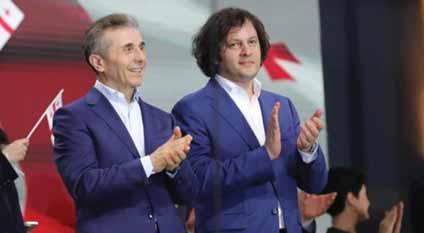
BY TEAM GT
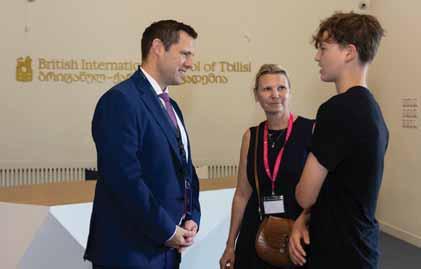
BY KESARIA KATCHARAVA
The British International School of Tbilisi (BIST) is renowned for offering a first-class holistic education. With over 520 students hailing from more than 50 different countries, BIST creates a diverse and multicultural environment where students grow academically, socially, and emotionally. As the principal of BIST since August 2024, Robert Snowden brings over 20 years of experience in education and has played an instrumental role in continuing the school’s legacy of excellence. BIST offers a curriculum grounded in global and UK educational standards, including the prestigious Cambridge International programmes, IGCSEs, and A-Levels.
The school’s state-of-the-art facilities, including an Innovation Centre, performing arts spaces, and an expansive sports and recreation complex, foster creativity and a healthy, active lifestyle for students. Situated next to Lisi Lake, the school’s beautiful surroundings offer unique learning opportunities that many urban schools simply cannot provide.
ROBERT SNOWDEN’S JOURNEY TO BIST: WHY GEORGIA?
When asked about his decision to move to Georgia and pursue a career in education, Robert Snowden described the opportunity as one that allowed him to contribute to an international educational community in a uniquely dynamic setting. “I was drawn to Georgia by the opportunity to contribute to an international educational community in a country with a fascinating blend of ancient history and modern dynamism,” he shared. The country’s cultural richness and stunning landscapes further solidified his decision, offering a rare combination of inspiration and opportunity.
What surprised him most after his arrival was the remarkable hospitality and sense of community among the Georgian people. “What has surprised me most since arriving is the deep sense of hospitality and community among the Georgian people. Their genuine warmth, coupled with their respect for education and eagerness to embrace global perspectives, has been incredibly inspiring,”
he said. The strong emphasis on education in Georgian families has also deeply resonated with him. “Georgian families place great value on learning, and their commitment to excellence has made my work here deeply rewarding.”
A COMPARISON OF EDUCATION SYSTEMS
Having worked in both the UK and internationally, Robert brings a wealth of experience to understanding the differences between the British and Georgian education systems. “Education in Georgia and the British international curriculum differ significantly in structure, teaching style, and academic focus,” he noted. While the Georgian system is more centralized and exam-driven, focusing on theoretical knowledge and teacherled instruction, the British curriculum offers a student-centered approach that emphasizes creativity, critical thinking, and a balanced academic experience.
“The British international curriculum, such as the Cambridge Pathway offered at BIST, promotes inquiry-based, studentcentred learning, fostering critical thinking, creativity, and a balanced approach that includes both coursework and examinations,” Robert explained. This system allows greater flexibility in subject choices, promotes extracurricular activities, and prepares students for top universities worldwide. “The international approach fosters independence, creativity, and global awareness, offering students in Georgia a unique educational experience within an evolving academic landscape,” he added.
BIST'S UNIQUE EDUCATIONAL PHILOSOPHY
When asked what distinguishes BIST from other international schools in Tbilisi and the region, Robert pointed to its dedication to individualised learning, promoting cross-cultural awareness, and building strong community connections.
“Our emphasis on personalised learning, intercultural understanding, and community involvement creates a nurturing yet academically challenging environment,” he noted, highlighting the school’s commitment to fostering both personal growth and academic excellence.
The qualifications and experience of BIST’s teaching staff also stand out. “Our teachers are all experienced, UK or equivalent-qualified professionals. They
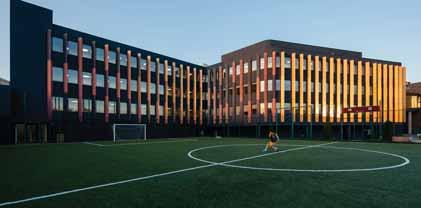
are also native English speakers, which ensures our students make rapid progress in developing fluency in English,” he shared. Moreover, the school’s location near Lisi Lake enhances the overall educational experience. “The school’s location near Lisi Lake also allows for unique outdoor learning experiences, which many urban schools can’t offer,” Robert explained, pointing out how the natural surroundings provide students with opportunities for outdoor education that help build resilience and creativity.
BIST places significant emphasis on both academic success and personal development. Robert described the school’s approach to supporting students as holistic, integrating both academic instruction and emotional well-being. “We believe in the importance of holistic education, focusing on both academic and personal development,” he said. The school tailors its approach to meet individual student needs, using informal assessments to provide early intervention where necessary. “Our teachers are highly skilled in using ongoing informal assessments to identify gaps early and provide additional support where needed,” Robert explained.
In addition to academics, BIST is committed to fostering strong pastoral care. “Our pastoral care system, school counsellors, and strong teacher-student relationships ensure every child feels heard, valued, and safe,” he noted. The school’s comprehensive support systems aim to ensure that students not only thrive academically but also develop emotionally and socially.
EXTRACURRICULAR ACTIVITIES, A WELL-ROUNDED EDUCATION
Extracurricular activities play a central role in student life at BIST. Robert mentioned how the school’s sports clubs, including football, swimming, basketball, and tennis, are highly popular among students. “We also have a strong tradition of sporting achievement, both locally and internationally, and our sports clubs are always popular,” he said. Professional coaches also contribute to the sports programmes, providing additional expertise in disciplines such as Taekwondo.
In addition to sports, BIST offers a wide range of creative clubs. “We also offer a wide range of creative clubs, including drama, ballet, individual music lessons, and arts,” Robert shared. These creative pursuits are an essential part of the school’s approach to developing wellrounded students. Further, the school’s partnerships with UCMAS and Builtits give students the opportunity to compete internationally, achieving success in a variety of competitions. “We also have an excellent partnership with UCMAS and Builtits, who run their program in our school, with our students competing and succeeding in international competitions,” Robert said.
GUIDING STUDENTS THROUGH TRANSITIONS AND CAREER CHOICES
As students near graduation, BIST ensures that they are supported in making key decisions about their future. “Our Sixth Form team is supported by University Guidance Counsellors who meet individually with students to discuss and support applications to university,” Robert said. The school hosts university fairs and workshops that give students the chance to meet directly with representatives from top universities. “We hold events in school, including local and international universities, so our students have the opportunity to speak directly with universities.”
Additionally, BIST incorporates career guidance into the secondary curriculum.
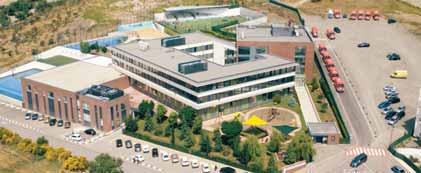
“Career guidance is part of our programme within Secondary, including CV writing and interview skills,” Robert shared. Work experience opportunities in Year 10 and Year 12 provide valuable insights into different professions. “We also support students with work experience in Year 10 & 12, providing them the opportunity to try first-hand what it is like to work in certain professions,” he explained.
BIST takes pride in its diverse, multicultural environment, and Robert emphasized that the school’s focus on inclusion is one of its key strengths. “We celebrate diversity through assemblies, curriculum content, and cultural events,” he said.
The school integrates themes of diversity, equality, and inclusion into everyday learning, ensuring that students feel respected and valued. “The variety of cultures within our student body itself is a daily lesson in inclusion, empathy, and belonging to a global community,” Robert noted.
The British approach to education, with its focus on Diversity, Equality, Inclusion, Justice, and Belonging (DEIJB), forms the foundation of the school’s values. “We model inclusivity in every classroom and ensure all voices are respected and represented in school life,” Robert explained, reinforcing the importance of respect and mutual understanding among students.
OUTDOOR LEARNING AND ENVIRONMENTAL EDUCATION AT BIST
BIST’s location next to Lisi Lake provides an invaluable resource for outdoor learning. “Our proximity to Lisi Lake allows for regular excursions into nature, and our Outdoor Learning programme helps our students develop outdoor skills, confidence, and creativity,” Robert shared. The school integrates the natural surroundings into its curriculum, from science trips to orienteering and crosscountry running. “We also use the local area to prepare for our Duke of Edinburgh Award programme, including hiking and camping,” Robert explained.
BIST is also committed to environmental sustainability, with annual tree-planting initiatives at Lisi Lake as part of the


school’s environmental education efforts.
“Our commitment to environmental sustainability also includes our annual tree-planting at the lake, where we have planted over 1,000 trees over the years,” he added, ensuring that students develop an awareness of their role in preserving the environment.
Robert highlighted the important role that the creative and performing arts play at BIST. “Creative and Performing Arts are integral to our ethos,” he said. Art, music, and drama are taught by specialists, and students’ work is celebrated through exhibitions and performances. “Students' work is celebrated through exhibitions and performances,” Robert said. The school also offers extracurricular opportunities such as music lessons and drama clubs, providing students with the chance to develop their artistic skills further.
Through BIST’s affiliation with COBIS, students have the opportunity to participate in international competitions, showcasing their creativity on a global stage. “Being part of COBIS also allows our students to enter international competitions where they can demonstrate their skills and creativity,” Robert noted.
Looking ahead, Robert envisions BIST continuing to grow and strengthen its community. "My vision is to ensure we continue to strengthen our community, nurturing confident, compassionate, and globally minded learners. I want BIST to be officially recognised as achieving world-class standards of excellence in all areas of learning, student outcomes, as well as personal development and wellbeing," he shared.
He highlighted plans to further develop the school’s facilities, aiming to create more opportunities and enriching experiences for students. BIST’s future will see students excelling at prestigious universities, including the UK’s top institutions and Ivy League schools in the US. “Through developing initiatives such as the Model United Nations and debating tournaments, our students will be empowered and thoughtful leaders with the confidence and passion to make a positive difference and shape the future,” he concluded.
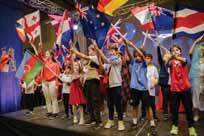

BLOG BY TONY HANMER
Now, I’m no botanist, but I am aware that a square meter of land in any wilderness has a mega-lot going on in it. Down to the microscopic level (which perhaps is a topic all its own, beyond my scope at present). Aside from the fauna (animal kingdom) and mycelia (mushrooms and other fungi), the flora (vegetable kingdom). Dighomi Meadows, the large area
near our apartment on the edge of Tbilisi, is no exception.
Flax? Those blue flowers currently in bloom. The world’s earliest surviving textile sample to date is from this plant, a piece found in a cave near Kutaisi which dates to about 35,000 years ago. Wow, not just a pretty face (This recent portrait of my wife is with local flax, the flower nearest her claiming sharp focus while I let her be slightly softened).
Poppies are currently appearing everywhere too at the moment, their large pure scarlet or smaller pink blossoms standing out with eye-popping intensity.
Anna, who runs the Dighomi Meadows NGO, also pointed out wild asparagus, edible straight from picked or cookable too, on our recent garbage cleanup run, as I mentioned in my article last week. Aspens, various evergreen trees, and so much more. The irises I also mentioned last time. There are probably 10 more green leafy things growing right here that my wife knows how to turn into pkhali, boiled veggie paste with crushed walnuts, vinegar and coriander, another Georgian staple. All part of the local life cycle, feeding each other and eating each other too.
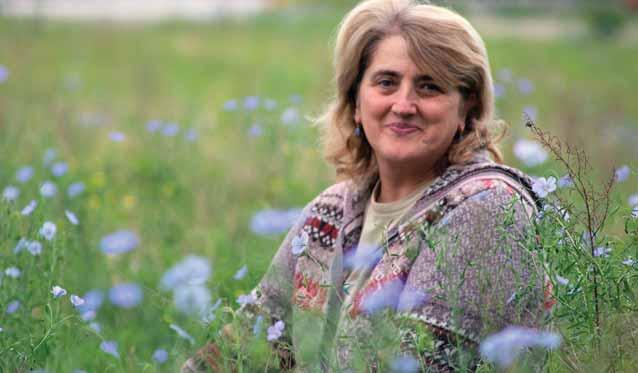
Photo by the author

Insects consume the vegetation, and in turn are eaten by the small silent bats which we saw flitting about for the first time on our twilight walk today. Woodpeckers rear chicks in the trees; so do many other birds, in various kinds of nests. Water birds make their homes in the reeds and rushes which line the many ponds in this area. Ducks, herons and others. Water mammals too, nutria in the same ponds and river otters in the banks and islands of the Mtkvari. Stick around, make a blind from which to observe (once the fauna are used to it) and life will nonchalantly reveal itself all around you.
The flora depend on various types of soil from which to grow, from sandy to clayey, which we have here, the latter so moist that puddles will form almost wherever you dig. Now, as everything greens up, the riot of existence is in full party mode. Later, like all over Tbilisi and in the warm lowlands of the whole country, summer’s heat will turn much of this to drab yellow or brown, and it’ll quieten down a bit. But for now it’s still been sweater weather here, sometimes; and Ushguli even had snow a couple of days ago as I write this, no great surprise. So the tug o’war between winter and spring
is still ongoing, until the latter decisively, greenly wins out, as it always does. My advice is: get out into the city’s many parks, the Botanical Gardens in Tbilisi’s old city, around Lisi or Turtle Lake, or Tbilisi Sea, and everywhere else while it IS still green. There is so much here to refresh the soul; even if (as is the case in our Meadows) there is garbage mixed in with it. The green and flowers win. Left to their own devices, they will reclaim everything anyway (look what is still being discovered by lidar deep in South America’s jungles, whole cities under the vegetation!). Sometimes even the noise of the city, not to mention the industrialized look of it, can just disappear in the flora. You get more oxygen, and give carbon dioxide back. Everybody wins. Don’t wait.
Tony Hanmer has lived in Georgia since 1999, in Svaneti since 2007, and been a weekly writer and photographer for GT since early 2011. He runs the “Svaneti Renaissance” Facebook group, now with over 2000 members, at www.facebook.com/groups/ SvanetiRenaissance/ He and his wife also run their own guest house in Etseri: www.facebook.com/hanmer.house.svaneti
BY IVAN NECHAEV
There are concerts that entertain. There are concerts that inform. Then there are concerts like Eliso Virsaladze’s May 4th return to the Tbilisi State Conservatoire — events so weighted with cultural meaning, interpretative depth, and sonic intelligence that the usual vocabulary fails. Not merely a performance, this was a séance — Chopin channeled through the disciplined metaphysics of an artist whose every phrase seems to speak from the other side of time. With the Grand Hall sold out weeks in advance, the evening was shaped as much by expectation as execution. But expectation, in Virsaladze’s case, is not hype — it is trust. The audience came not for sentimentality, but for musical judgment. And what they received was a traversal of Chopin so uncompromisingly analytical, so stripped of decorative excess, that even silence — her patient, trembling rests — became a form of critique.
The program opened with the Polonaise-Fantaisie in A-flat major, Op. 61, a late and structurally elusive work that often resists clarity. In Virsaladze’s hands, it did not "unfold" — it unraveled, like memory itself. Her approach was neither romantic nor abstract. It was architectural: she gave space for every harmonic modulation to breathe, but without letting the fantasia spiral into formlessness.
The bass line was articulated with a near-pedantic clarity — each pedal tone
and chromatic slip felt chiselled. Her rubato was controlled, almost introverted: no indulgent swoons, but hesitant pauses that seemed to ask, "Can music still bear the weight of dignity?" It could, and it did. The opening's descent into thematic fog was rendered not as dream but as philosophical doubt — like a voice speaking itself into disappearance, then clawing its way back with trills and resistance. Then came the Sonata No. 3 in B minor, Op. 58 — a monument of Romantic sonata form, frequently overplayed as a vehicle for brilliance. Virsaladze brought none of that. She approached it instead like a thinker returning to an ancient, damaged manuscript: restoring it, not embellishing it.
The Allegro maestoso was a lesson in controlled eruption. Virsaladze attacked the octaves with deliberate aggression, but immediately pulled back — a dialectic of force and fragility. The second theme did not "sing" in the usual way, but rather hovered — ironic, questioning, unresolved. Her articulation of the descending minor sixths felt not ornamental but confessional.
In the Scherzo, she played with nervous urgency — not playful, but anxious, nearly sarcastic. A kind of haunted dance, where the hands chase each other like twin voices in an unfinished fugue. The Largo, however, was the night’s centre of gravity. This was no lullaby: it was a prayer said through clenched teeth. Her voicing of inner harmonies turned the melody into a shadow of itself, each note dipped in grief.
The Finale came not as resolution but as protest. Virsaladze’s tempo was slightly

Photo by the author
held back — Presto non tanto taken seriously — allowing the harmonic friction to seethe. The final cadence did not announce victory, but necessity.
In the Nocturne in C-sharp minor, Op. 27 No. 1, Virsaladze played the opening motif as if afraid of waking someone — herself, perhaps. The left-hand triplets, often flowing like water, here felt burdened, resisted — time lagging behind itself. She reminded us that Chopin’s nocturnes are not just songs of night, but meditations on isolation.
The Nocturne in D-flat major, Op. 27 No. 2, often smothered by prettiness in lesser hands, was rendered with chastity
and suspicion. Her dynamics barely rose above mezzo-forte. It was a whisper of elegance, not a cry of passion. Where others shimmer, she questions. And by doing so, she dignifies. Then came the sequence of seven Mazurkas. Op. 30 No. 4 in C-sharp minor was built from silence — each dance fragment arriving late, like a half-forgotten ritual. The G-sharp minor that followed felt subversive in its asymmetry: she accented the wrong beats, blurred the bar lines, turning rhythmic instability into a political act. The D major was brighter but never innocent — each repeat of the theme slightly deformed,
as though remembering itself through trauma.
The final triptych — Op. 59 Nos. 1–3 — unfolded as a collapsing triptych: A minor, A-flat major, F-sharp minor. Together, they mapped an emotional terrain that rejected catharsis. No. 1 in A minor was brittle and halting; No. 2 in A-flatpulsed with dislocated charm; and No. 3 in F-sharp minor closed the set not in triumph, but in grim endurance. A circular motion that refused resolution — echoing Virsaladze’s entire artistic ethos.
Virsaladze uses the piano like a scalpel, not a mirror. Her tone is never glossy. She does not indulge in resonance for its own sake. The Steinway she played on — responsive but restrained — became an instrument of incision. Her legato is rigorous; her pedaling economical. When she uses the sustain pedal, it’s as punctuation, not perfume.
This was not a recital of flamboyant gestures or performative charisma. There were no bows milked for applause, no expressive facial grimaces. In fact, her stillness bordered on the ascetic. But in that restraint was moral force. Virsaladze plays Chopin not as entertainment, but as testimony — to loss, to endurance, to the stubborn persistence of clarity in an age of noise.
In our current era of cultural acceleration, where interpretation is often flattened into “content,” Virsaladze’s approach is radical. She does not interpret Chopin — she interrogates him. In a sold-out hall, she played as if she were alone. And in doing so, she challenges the listener to interrogate themselves.
